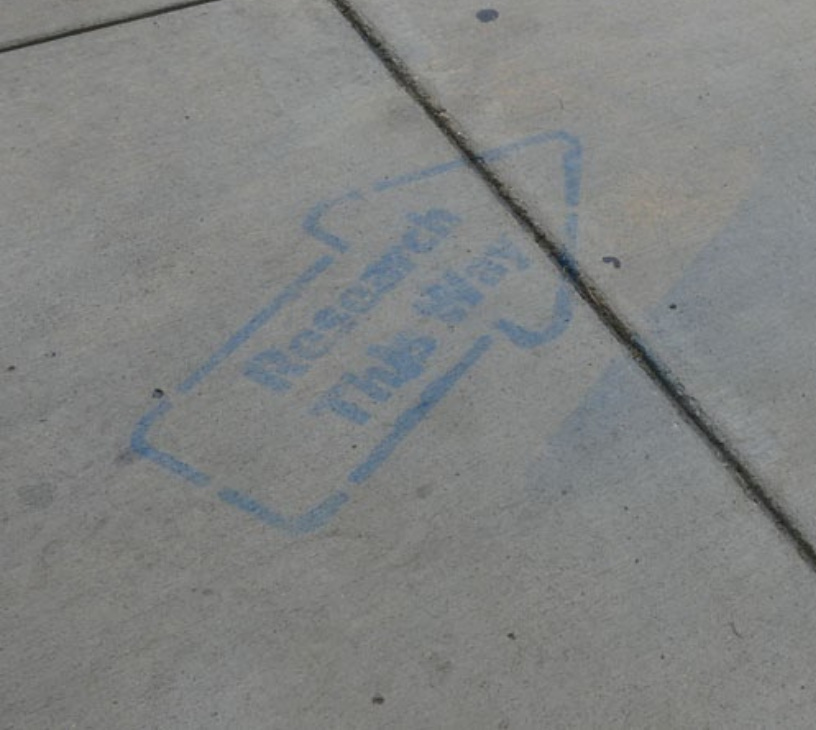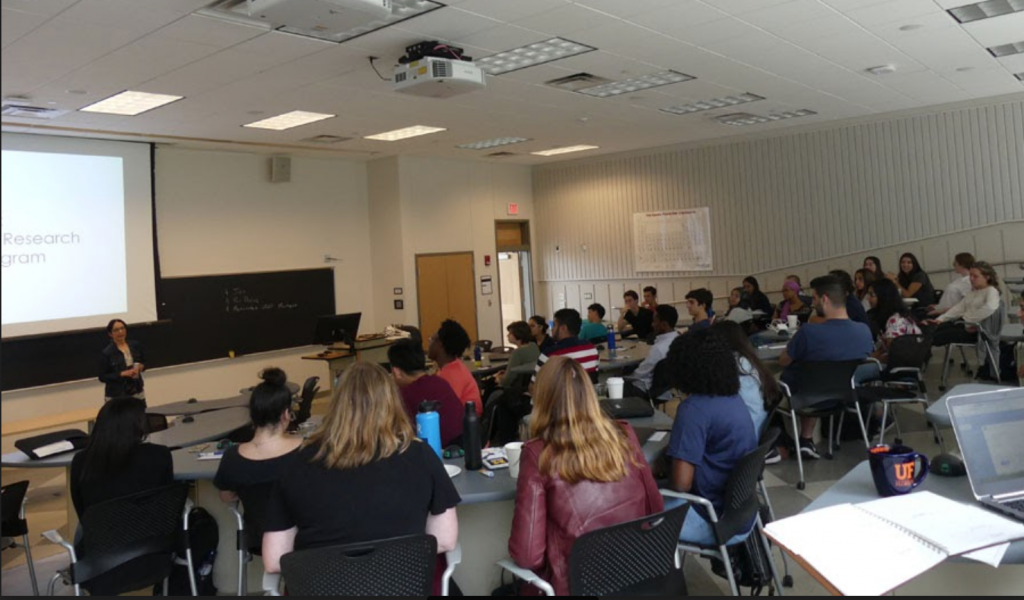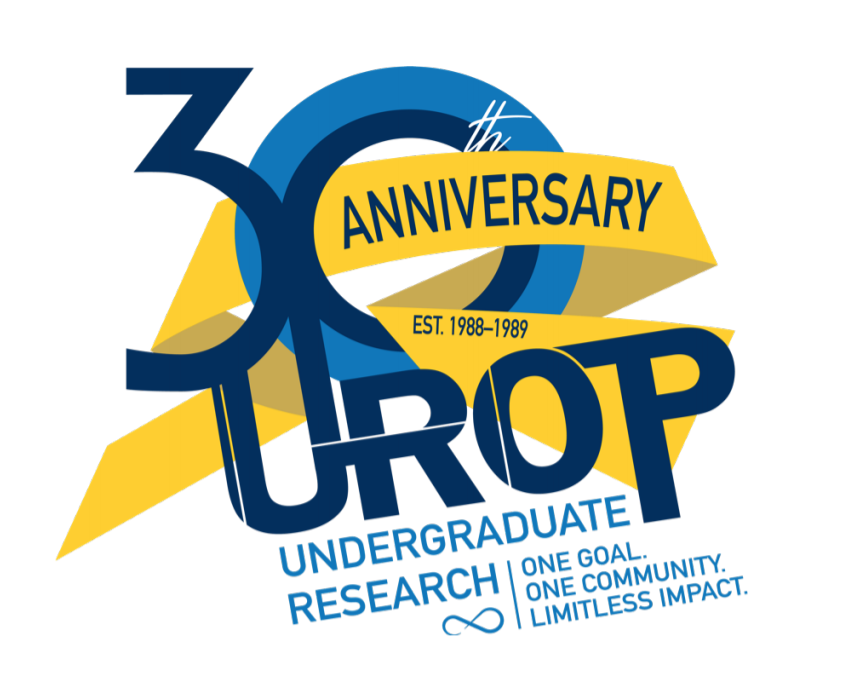
Undergraduate Research Opportunity Program (UROP) Peer Facilitators (left to right) Varisha Essani, Temitope Oyelade, Bashair Pasha, Vinita Chaudhary, Ceren Ege and Aniela Crayton display their UROP pride
The Undergraduate Research Opportunity Program (UROP) is one of the most popular programs for first year, second year, and transfer students to get involved in at the University.
UROP provides the opportunity for students not only to engage in projects with U-M researchers and community partners, but also to immerse in a rich curriculum focused on supplementing and supporting their research and academic experiences. The course is led by undergraduate juniors and seniors who have previously participated in the program, called Peer Facilitators (PFs).
UROP PFs play a large role in shaping student research and academic experiences through monthly 1:1 meetings with their students and through facilitating a seminar on research methods, professional development, and personal advancement. The impact of the PF component to the program is two-fold: it provides a platform of support and academic engagement for younger students, but also empowers older students to become teachers and leaders.
Making impact on underclassmen, transfer experiences

PFs act as a bridge for student success by combating imposter syndrome and inequity, and contributing to student retention and achievement. UROP accomplishes this by creating the opportunity for younger students to develop strong professional relationships with older students, as noted by Biophysics senior Kevin Wunderly and Biomedical Engineering senior Jeremiah Hollis.
“When I was a freshman, it was really nice to have someone older that can teach you the ropes and be able to listen to you,” Wunderly said, “because it’s a lot more intimidating to go to, say, an advisor or a professor. I still keep in contact with my peer facilitator from my freshman year.”
PFs provide the opportunity for students to ask questions in a low-stakes and supportive environment.
“As a PF, students are more willing to talk to you because you’ve been in their shoes recently and you had all the same questions that they’re having right now about the University and about UROP in general,” Hollis said, “I think that experience and the exposure just to an upperclassman is very valuable to underclassmen.”
UROP also works to facilitate community college transfer student success, an effort UROP emphasizes through the Changing Gears program. Changing Gears are UROP seminar groups which focus on promoting positive transfer experiences through exploring research opportunities and creating a community of transfer students in the classroom. The sections are led by PFs who were also transfer students.
Kia Schwert, a LSA senior studying Sociology and Women’s Studies, says one of her favorite parts of being a PF is being able to make transfer student experiences easier.
“One of my students at the end of last semester came into the office and they were really struggling,” Schwert said, “I was able to not only listen and be empathetic but also come up with an action plan with them and give them a list of resources and people to talk to. As challenging as that was, that was really fulfilling for me because at that moment, I felt that my struggle, my challenge, my frustrations as a transfer and non-traditional student were not in vain. I get to pass this knowledge onto someone else to make their time here a little bit easier.”
Supporting during COVID-19
When the COVID-19 crisis developed in March, many UROP students were unable to continue with their research altogether or in the same way that they had planned. This meant students may have had experiments cut short, or were perhaps unable to collect data altogether, as many projects are geared towards the cumulation of work of the entire academic year. However, throughout this process, UROP PFs have been able to work with students to develop creative solutions for their research projects and to provide support through continuing to meet 1:1 virtually with students, Public Health Sciences junior Anna Stabnick said.
“I have been having more in-depth conversations with my students than I was before, because we are all going through this crisis moment together,” Stabnick said, “I think I’ve gotten to know my students at a more personal level because of that.”
Another aspect of change for UROP students during this crisis is the cancelation of the UROP Symposium, which would have taken place April 22. The annual event is a platform for UROP students to share what they’ve learned over the course of the academic year through the creation of a poster presentation, an unique opportunity for students to practice their research communication skills.
In lieu of a symposium, students will still create a final presentation of their research and have a “virtual” symposium on canvas discussion boards, where other students in the section will have the opportunity to review other student work.
“As a life sciences facilitator, many of my students do bench-work, lab-work, a lot of hands on experience, and of course, they are not able to do that,” said Eric Mettetal, MCDB senior. “I’m really proud of them for having the willingness and the courage to reroute the direction of their experience and present some quality research with what they have been able to do at this point.”
Teaching and Learning

The opportunity to teach a seminar and act as a leader has provided plentiful opportunities for professional growth for PFs. Some PF duties include meeting monthly with each student assigned to your section, which can range to 25-40 students, developing and teaching content for up to 18 seminars throughout the academic year, performing timely grading on assignments, and serving as a liaison between students and research mentors, all while maintaining a student schedule.
Many PFs find facilitating a classroom a challenge but also one of the biggest areas for personal and professional development.
“I have learned that I am able to be in front of students and to facilitate discussion and present information,” Mettetal said, “and that’s something that I didn’t think I totally had the ability to do before I started as a PF.”
Between learning to engage with students on a deeper level, to adapting to challenges in the classroom, to acting as a liaison for students having issues in their labs, many PFs believe the skillsets they’ve gained in serving in this role will help them as they start their careers, and did help them in their internship experiences, said Vinita Chaudhary, business senior.
“My oral and social skills have skyrocketed in terms of before and after UROP,” Chaudhary said, “You’re forced into the situation where you have to have professional communication and that helped me so much when I went into my junior year internship.”
“I think a lot of the skills that you learn as a PF are readily applicable to a future career of being a manager or team member,” Hollis said.
Paying it Forward
Many current PFs state that the impact their PFs made when they were in the UROP program were part of the motivation to apply to the position.
“My freshman year, my PF was my source of guidance for pretty much everything,” Mettetal said, “I really don’t think I would be where I am without him. Because I was inspired by him, I really wanted to apply to the UROP team, and I’m really grateful for that.”
Current UROP student and LSA sophomore Ihsan Akhtar will become a UROP PF for next academic year and thanks the contributions his Peer Facilitator Anna Stabnick made towards bettering his UROP experience.
“My Peer Facilitator has made all the difference,” Akhtar said, “ This year of growth and learning would not have been possible without the contributions of PF […] and I am thankful that she was there to help me become a more confident person. Thinking of how my peer facilitator made the UROP experience special, I was motivated to become a peer facilitator myself, in that I may help and inspire students next year.”

The nationally recognized program began in 1989 with 14 student/faculty partnerships and celebrated its 30th-anniversary last year. Today in it’s 31st year, UROP projects number 864 projects guided by 681 mentors across all 19 U-M schools and colleges as well as community partners. There are 1380 students this academic year, and 44 Peer Facilitators.
“Undergraduate research really puts students in a position of responsibility where they are not only interacting with people professionally early in their college career, but also contributing to something that’s going to eventually impact and help people,” said Wunderly. “That’s why undergraduate research can help anyone, not just people who are going off to graduate school. It’s not just a resume builder, it’s a life builder.”


